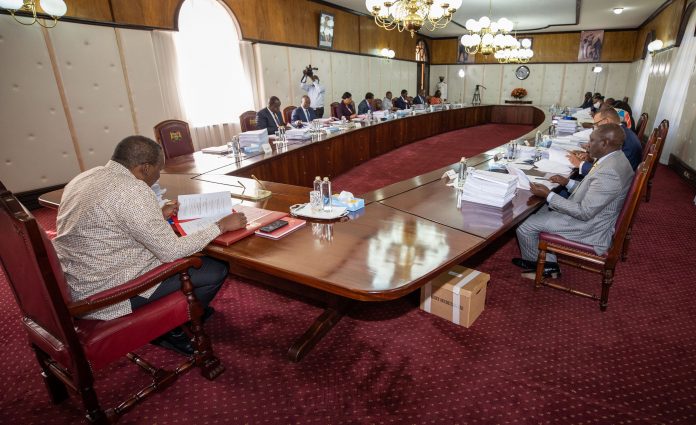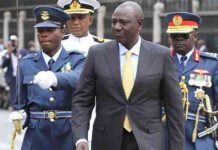President Uhuru Kenyatta chaired a session of the nation’s apex policy organ – Cabinet, at State House, Nairobi.
Today’s Cabinet Meeting was preceded by 27 meetings of the Cabinet Committee on National Development Implementation and 31 sessions of the National Development Implementation Technical Committee (NDITC) – the Principal Secretaries Forum. The National Development Implementation and Communication Cabinet Committee (NDICCC) features all Cabinet Secretaries as well as the Hon. Attorney-General.
During today’s session, the Cabinet considered the state of the economy within the context of the 2022 Economic Survey. In 2021, the Kenyan economy recovered from the crippling effects of the COVID-19 Pandemic and expanded by 7.5% compared to a contraction of 0.3% in 2020.
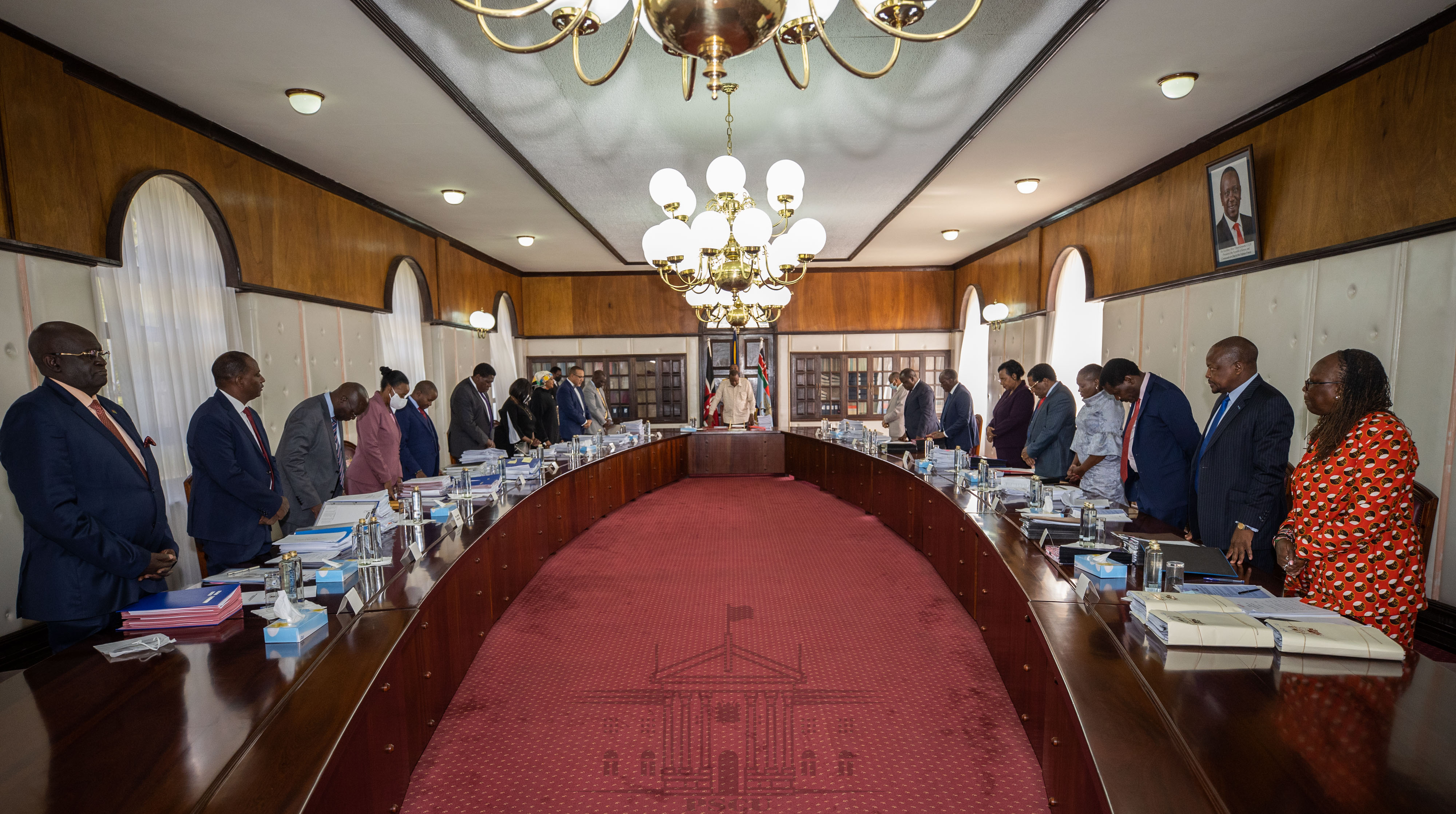
As part of examining Kenya’s economic outlook, the impact of the geo-politics and various events on the global stage were assessed.
It was noted those events had constrained global supply chains and led to significant escalations in the prices of energy, crude oil, food, farm-inputs and construction materials. With regard to the price of crude oil, it was noted that the prices had surged from a low of
40 USD per barrel in the year 2020 to USD 110 in 2022. Therefore, to cushion Kenyans against the three-fold increase in energy prices Cabinet directed the National Treasury to continue implementing the fuel price stabilization programme.
The Cabinet Meeting also considered the state of food security in the country and noted that the food security situation in the current year has been negatively impacted by the delayed onset of the long rains.
In response to this challenge, the Cabinet directed the Ministry of Agriculture to enhance access of the subsidized fertilizer, and also directed the Ministry of Water, Sanitation & Irrigation to fast-tract the construction of various ongoing dams, water-pans and reservoirs so as to enhance the coverage of land under irrigation.
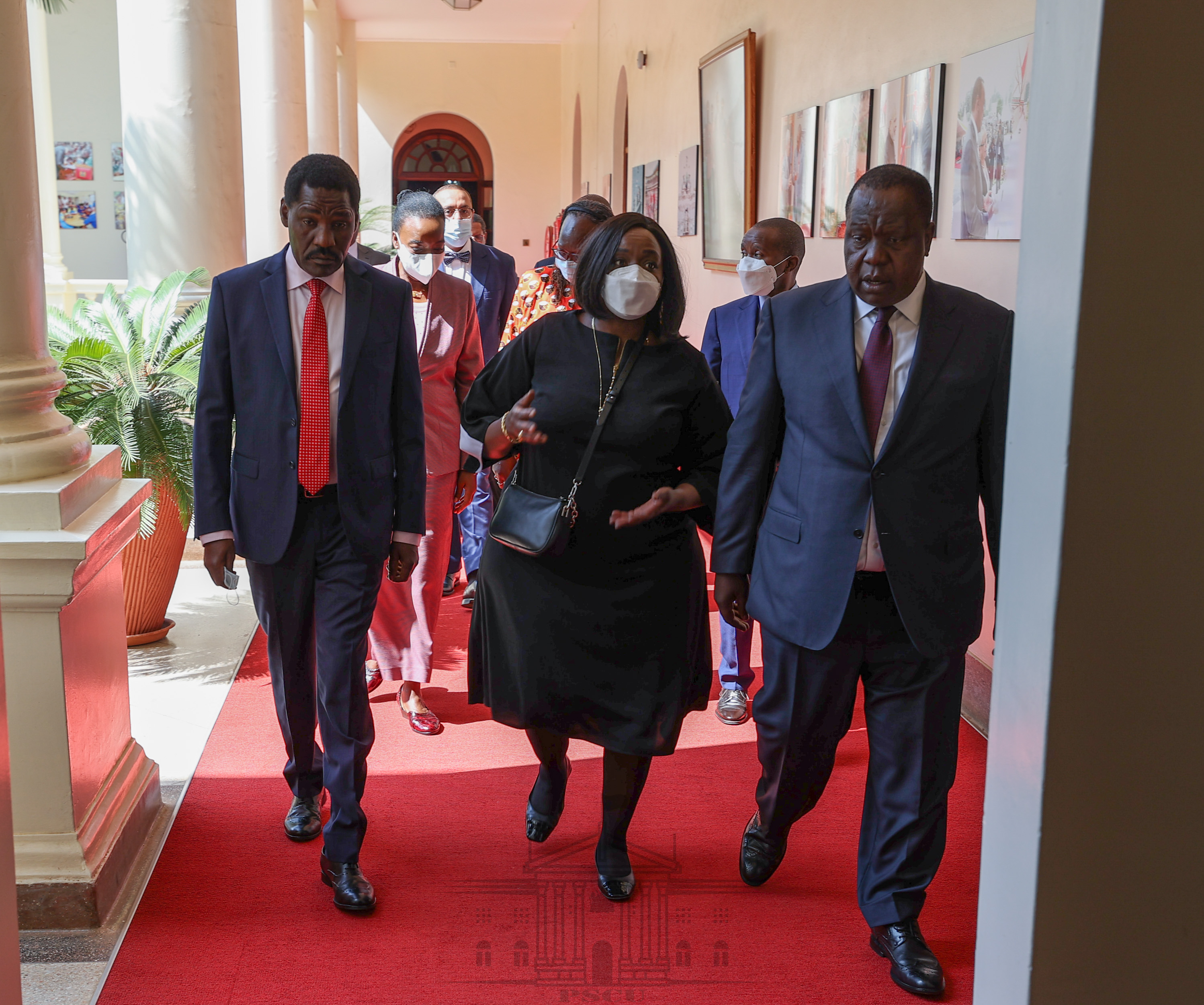
The Meeting also considered Bills of Parliament, Policies, Treaties and Conventions, and the Progress Report of Implementation Status of various Priority Projects with a focus on: Education, Agriculture, Healthcare, Enterprises, Infrastructure, Energy, Information & Communication, Industrialization, Investments, Foreign Relations and Defence, and private investments in Kenya Airways PLC and Telkom Kenya Limited. A. POLICIES, BILLS AND OTHER STRATEGIC INTERVENTIONS
As a first for any County Government, Cabinet granted its seal of approval to the application by the Laikipia County Government to borrow Ksh. 1.16 Billion through the issuance of a domestic Infrastructure Bond at a market-determined coupon.
The grant of approval was made in accordance with the procedures set out under the Public Finance Management Act (No. 18 of 2012). The objective of the Infrastructure Bond is to finance implementation of projects including: provision of water for agricultural production, and improvement of the business environment by upgrading markets and town infrastructure; which will provide additional jobs to the residents of Laikipiaand improve their household income and livelihoods.
To address the plight of Micro, Small, and Medium-sized Enterprises who had made supplies to the National Youth Service; Cabinet approved the payment of the National Youth Service’s (NYS) historical pending bills that have been verified and authenticated by the Pending Bill Multi Agency Team (PB-MAT).
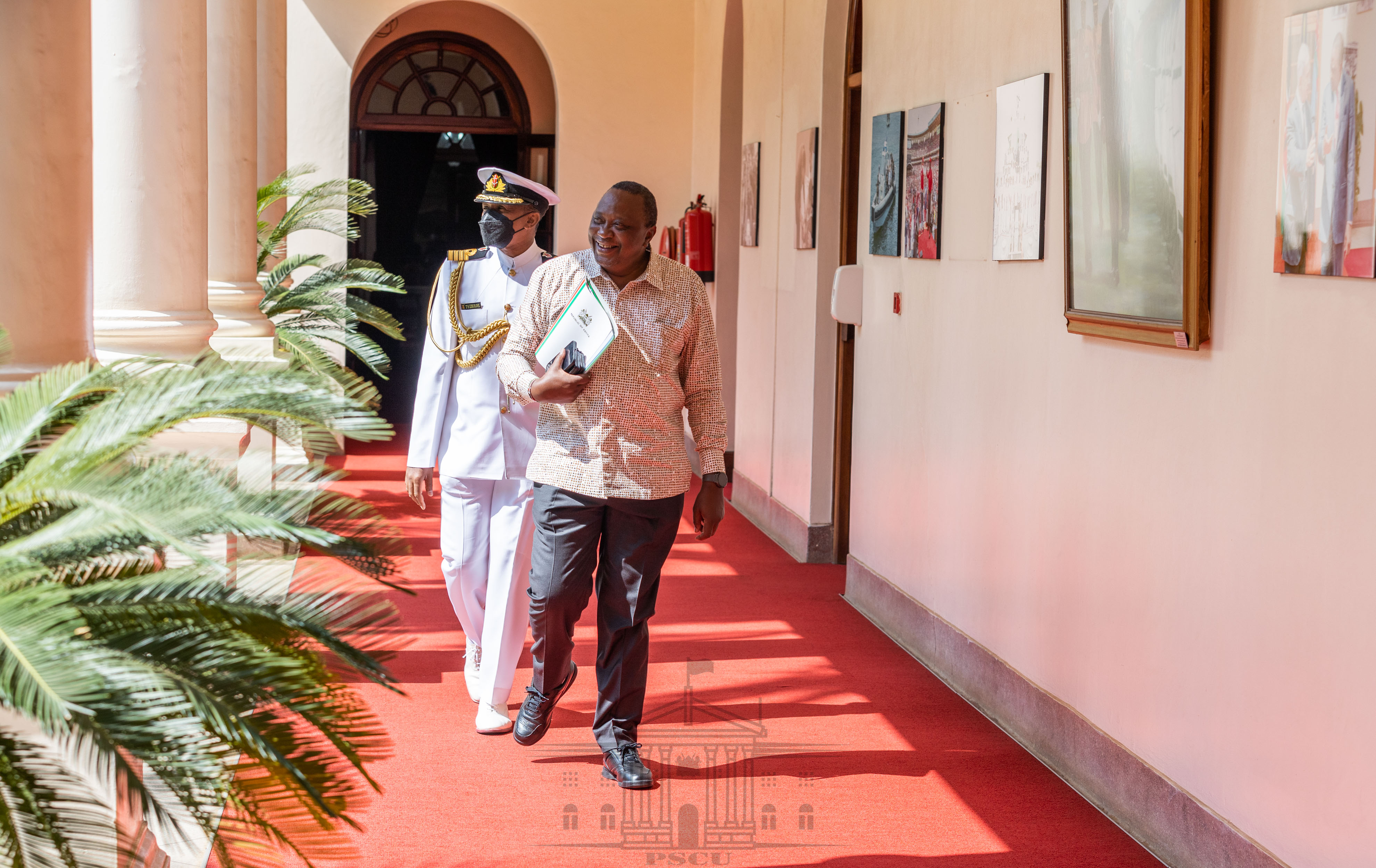
As part of the Administration’s agenda on Affordable Housingunder the Big-Four Agenda, Cabinet approved the Sale/Lease of the residential houses and commercial facilities developed under the MavokoSustainable Neighborhood Housing Programme Scheme; and further granted approval for the proceeds of the sale to be channeled into Kenya Slum Upgrading Low Cost Housing and Infrastructure Trust Fund to support other slum upgrading initiatives.
To fortify the Administration’s efforts on revitalization of agriculture, generally and our nation’s leading cash crops such as Tea and Coffee in particular, Cabinet sanctioned a review of VAT and Certificate of Requirements on Tea and Coffee for both domestic and international markets. Additionally, to address challenges associated with food insecurity, Cabinet approved the Policy on Large Scale Commercialization of Public land held for Agricultural Production. The Policy seeks to provide a framework for utilization of idle land owned by public institutions for large scale commercial agricultural production.
In regard to the Information and Communication Sector, Cabinet approved the National Spectrum Policy; which policy changes the framework for assignment and management of the radio frequency spectrum in Kenya. The Policy is part of the Administration’s agenda to further spur the continued growth of the communications sector.
To institutionalize the reforms undertaken by the Government in public procurement, Cabinet approved the National Public Procurement and Asset Disposal Policy. The Policy anchors the overarching framework of promoting fairness, equity, transparency, competitiveness, and cost effectiveness in the procurement of goods, works, and services by public entities; thereby achieving greater value for money.
The Session also considered and approved the Kenya Population Policy for Sustainable Development; which builds on the progress and lessons learnt in implementing past population policies while also responding to new realities and challenges with respect to Kenya’s changing demographic trends. The overall goal of the Policy is to ensure a high quality of life for the people of Kenya by securing a healthy, well educated, and a competitively trained and empowered populace for sustainable development.
The Policy addresses all challenges arising from the implementation of the three population policies developed since independence: Sessional Paper No. 4 on Population Policy Guidelines, Sessional Paper No. 1 of 2000 on National Population Policy for Sustainable Development (NPPSD), and Sessional Paper No. 3 of 2012 on Population Policy for National Development (PPND).
In regard to legal education and training, Cabinet approved the proposal to decentralize the provision of the Advocates Training Programme (ATP) so as to address challenges occasioned by large number of students undertaking the mandatory post-graduate programmeonly at the Kenya School of Law.
The session also considered and approved/ratified the following Bills, Policies, Regulations and other statutory instruments, as follows:
I. The Kenya School of Law (Amendment) Bill, 2021;
II. The Supreme Court (Amendment) Bill, 2021;
III. The Intellectual Property Bill, 2021;
IV. The Kenya Universal Health Coverage (UHC) Policy, 2020-2030;
V. The Draft Microfinance Bill, 2021;
VI. The Public Records, Archives and Documentation Bill, 2021;
VII. The Restructuring of the Maritime Security Committee;VIII. The National Rating Bill, 2021;
IX. The Environmental Management and Co-ordination Bill, 2021;
X. The Statute (Miscellaneous) Amendment Bill, 2022;
XI. The Knowledge Management Policy for Kenya;
XII. The Financial Status of Kenya Power & Lighting Company PLC;
XIII. The Right-Sizing of Kenya Airways PLC;
XIV. The Grant of Privileges and Immunities by the Government of the Republic of Kenya to Inter-Governmental Organizations and External Agencies;
XV. Proposed Legal Amendments to the SACCO Societies Act No. 14 of 2008 to Facilitate Licensing and Regulation of a Central Liquidity and Shared Services Platform (SACCO Central) for the SACCO Societies in Kenya;
XVI. Proposed Legal Amendments to the SACCO Societies Act No.14 of 2008 to Facilitate Operationalization of the Deposit Guarantee Fund (DGF) for SACCOs in Kenya;
XVII. The Dedan Kimathi Comprehensive Cancer Centre;
XVIII. Water and Irrigation Sector Strategies, 2020-2025;
XIX. The Status and Progress Made Towards Reforming the Dairy Sector in Kenya;
XX. Investigations for Recovery of Illegally and Irregularly Registered Public Lands;
XXI. The Establishment of a Modern Neuropsychiatric National Teaching and Referral Hospital;
XXII. The Proposed Stage Construction of the Garissa – Isiolo (A10) Road (150KM) to Gravel Standards, Associated Links and Township Roads; and the Proposed Expansion of the Nairobi Eastern Bypass into a 4-Lane Dual Carriageway, together with Associated Interchanges and Service Lanes;
XXIII. Funding, Design and Construction of Bute Dam Water Supply Project;
XXIV. The Development Projects Stock-Take;
XXV. Review of Multiple Accreditation of Kenya’s Missions Abroad;
XXVI. Ratification of the WIPO Performance and Phonograms Treaty to Protect the Rights of Performers and Producers; and
XXVII. Implementation of the Framework for Revival of the Kenya National Shipping Line.
B. TREATIES AND CONVENTIONS
To further secure Kenya’s overall competitiveness, Cabinet considered and approved the following treaties and conventions:
I. The Accession to the 1970 UNESCO Convention on the Means of Prohibiting and Preventing the Illicit Import, Export and Transfer of Ownership of Cultural Property;
II. The Ratification of the Minamata Convention on Mercury;
III. Agreement between the Government of Republic of Kenya and the Government of the United States of America on Employment of Dependents of Official Employees;
IV. The Agreement between the Government of the Republic of Kenya and the Government of the Republic of Turkey on Defence Co-operation;
V. The Agreement between the Government of the Republic of Kenya and the Government of the Arab Republic of Egypt on Defence Co-operation;
VI. The Agreement between the Government of the Republic of Kenya and the Government of the Republic of Malawi on Defence Co-operation;
VII. The Agreement between the Government of the Republic of Kenya and the Swiss Federal Council of Defence Co-operation in Training on Peace Support Operations;
VIII. The Agreement of Defence Co-operation between the Government of the Republic of Kenya and the Government of the Democratic Republic of Congo;
IX. The Agreement between the Government of the Republic of Kenya and the Government of United Kingdom of Great Britain and Northern Ireland on Defence Co-operation;
X. The Modification of the Memorandum of Understanding Between the Government of Republic of Kenya and the Government of the United States of America on Business, Tourist and Student Visa Regime;
XI. Ratification of Protocols Relating to Article 50(A) and 56 of the Chicago Convention on International Civil Aviation;
XII. The Framework Agreement on Cooperation and the Memorandum of Understanding on Political Consultations between the Government of the Republic of Kenya and the Federation of St. Kitts and Nevis;
XIII. Ratification of African Union Treaty for the Establishment of the African Medicines Agency (AMA);
XIV. Kenya’s Ratification of the African Union Convention on Cross Border Cooperation (NIAMEY Convention);
XV. Ratification of Bilateral Air Services Agreement Between Kenya and Austria; Kenya and Barbados; and Kenya and Tanzania;
XVI. Framework Agreement on the Development of Sustainable Green Industries in the Republic of Kenya between the Government of the Republic of Kenya and FortescueFuture Industries PTY Limited (Australia);
XVII. Ratification of Bilateral Air Services Agreements between Kenya and Czech Republic; Cyprus; Chile; Belize; and Suriname; and
XVIII. The Agreement Between the Government of the Republic of Kenya and the Government of the Republic of France on Defence Co-operation
C. HOSTING OF INTERNATIONAL BODIES/INSTITUTIONS
To cement the place of Kenya as a diplomatic hub and as a host to leading international bodies/organizations, Cabinet considered and approved the following host country agreements:
I. Hosting of International Fund for Agricultural Development (IFAD) Regional Office for East and Southern Africa in Nairobi;
II. Hosting of the Temporary Secretariat of the African Audiovisual and Cinema Commission (AACC) in Kenya;
III. Hosting of the MasterCard Foundation Country Office in Nairobi, Kenya; and
IV. Host Country Agreement Between the Government of Kenya and the Rockefeller Foundation.



